The Top 6 Most Powerful Herbs for Improving Digestion and Healing the Gut
BY MARLENE HOUGHTON, Ph.D
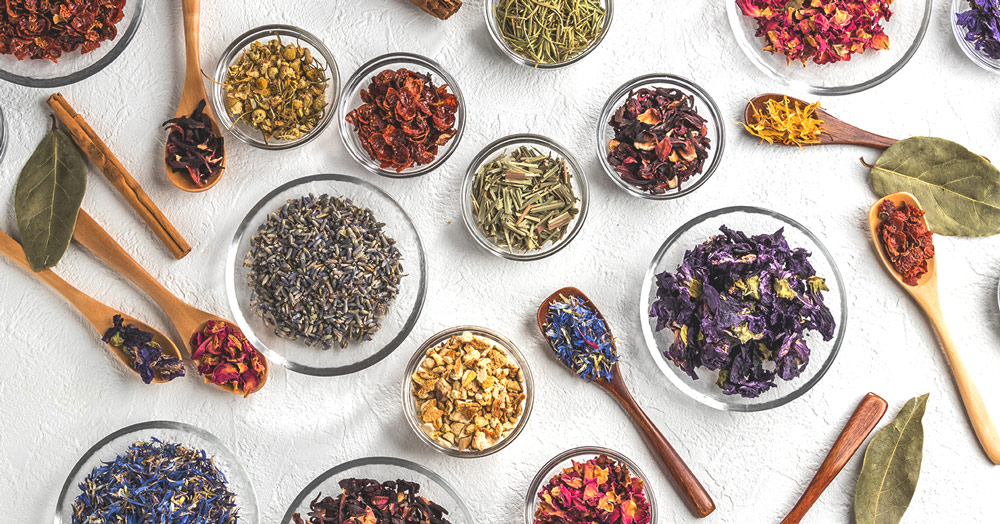 digestive herbs work in a number of interesting ways from healing the lining of the gut to increasing the secretion of digestive juices to repairing digestion related organs like the liver, gallbladder, pancreas and stomach. photo: shutterstock
digestive herbs work in a number of interesting ways from healing the lining of the gut to increasing the secretion of digestive juices to repairing digestion related organs like the liver, gallbladder, pancreas and stomach. photo: shutterstock
The digestive system is dedicated to breaking down food and allowing its nutrients to be absorbed into the bloodstream, from where they are then carried to every part of the body. Unless you regularly incorporate herbs for digestion into your diet, this system is subject to a variety of problems and it is important that it is functioning well for the health of the whole body.
Stomach pain due to ulcers and indigestion from over-eating, irritable bowel syndrome (IBS), constipation, and diarrhea are just some of the problems that can plague this sensitive area, but there are also herbs for digestion that can help with each of these. The liver, which is part of digestion, gets special attention in this article and its function can be enhanced with digestive herbs.
The liver is an amazing chemical factory performing more than five hundred major tasks, using thousands of different enzymes. The liver plays a vital role as a filtering system for the blood.
There are a number of digestive herbs that can help improve the function of the digestive system, and each has a unique purpose in digestive health and detoxification support.
1. Artichoke (Cynara scolymus)
Nature’s Liver & Digestion Tonic
Legend has it that the mighty god Zeus was rejected by the object of his desire, the beautiful Cynara, so he turned her into a thistle and thus created the artichoke plant!
The artichoke has been used medicinally as a digestive herb since the time of the Roman Empire. Belonging to the daisy family, artichoke can grow up to six feet high. The medicinal qualities of this plant are well recognized, and the first mention of artichoke’s health benefits was documented by pupils of the Greek philosopher Aristotle.
Used as a liver tonic, artichoke’s restorative power improves liver health. As one of the strongest herbs for digestion, it stimulates bile flow, thus leading to better digestion and helping the body break down food and alcohol more effectively. This digestive herb also strengthens liver and kidney function.
Artichoke’s active properties have many benefits, but its main ingredient is cynarin. High concentrations of cynarin are found in the leaves, and they can be used to improve appetite and digestion. Their bitterness has a stimulating effect on the liver and also a cooling action. As one of the top herbs for digestion, artichoke appears to be helpful in alleviating symptoms of irritable bowel syndrome, improving nausea, bloating, constipation, and pain from gas. Research has shown that, taken to help maintain a healthy digestive system, digestive herbs like artichoke may also help maintain cholesterol at normal levels. Artichoke extracts are available in tablets and tinctures from health stores.
Where to Get It:
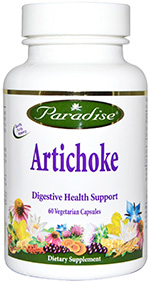 Paradise Herbs Artichoke Extract
Paradise Herbs Artichoke Extract
Paradise Herbs offers an ultra high quality, full spectrum artichoke leaf extract grown without the use of any chemicals and pesticides. Their special low temperature extraction process preserves all sensitive liver cleansing and digestive enhancing medicinal compounds just as nature intended.
2. Dandelion (Taraxacum officinalis)
Digestive Bitter Herb
The name of this flower is derived from the French “dent de lion” meaning lion’s tooth. This name was supposedly given to this plant by a 15th century surgeon, due to the dandelion’s jagged shaped leaves. Folk healers have long prescribed the root of this cleansing digestive herb for liver and digestive problems.
Today this herb is used for its diuretic properties, which have now been confirmed scientifically. Dandelion restores potassium rather than depleting it like conventional diuretics do, and it promotes healthy digestive functioning, ranking it as one of the best herbs for digestion. A large part of the immune system is connected to the digestive system, and both are intricately woven, so if one is imbalanced the other is affected. Many people see an improved immune response after using digestive herbs.
Dandelion coffee made from the roasted roots is a renowned liver tonic and detoxifier. Dandelion tea made from dried leaves and taken regularly throughout the day helps the body excrete excess fluids through urination.
This herb is also useful for premenstrual bloating caused by an excess of fluid build-up prior to a menstrual period. Dandelion is available in the form of tea or as capsules, tablets, tinctures, and dandelion root coffee from health stores. It combines well with nettle, working together these herbs for digestion purify the blood.
Where to Get It:
![]() Oregon’s Wild Harvest Organic Dandelion Root Capsules
Oregon’s Wild Harvest Organic Dandelion Root Capsules
Oregon’s Wild Harvest offers a 100% pure dandelion root powder for easy absorption and consumption of this powerful liver cleansing, digestive herb. 100% vegan capsules deliver the dandelion powder effortlessly to avoid its bitter taste for those who don’t like herbal medicines.
3. Ginger (Zingiber officinale)
Warming Digestif and Yang Herb
In addition to being one of the best digestive herbs, this amazing warming spice also impacts the circulatory system. This root was introduced into Europe during the Roman Empire, and it has held an honored place as one of the herbs for digestion in traditional medicine for a very long time. Chinese herbalists have used ginger root for 2,000 years, and the ancient Greeks prized it as an aid to digestion, mixing powdered ginger into bread.
Growing wild in Asia, ginger’s unique properties and therapeutic benefits as one of the herbs for digestion are now being rediscovered and confirmed scientifically. Today it is used therapeutically to alleviate nausea and upset stomach, due to its anti-emetic properties, and it is also used to alleviate stomach cramps. Gingerols and zingerones are the active anti-inflammatory constituents of this pungent spice. It is a natural remedy for heartburn, as well as nausea caused by motion sickness, so it is helpful for travelers. As a digestive tonic herb, ginger helps normalize the digestive process. Before eating anything, the wise sage Confucius would ginger up his food by sprinkling a little of this yang, digestive herb spice onto his meal. He knew that some ginger would promote appetite, prevent nausea, and help expel gases from the stomach and intestinal tract.
Ginger root can be bought in any supermarket or taken in capsule form for a more potent effect. The root of this digestive herb can be grated and made into a warming ginger tea that is helpful for soothing nausea.
Where to Get It:
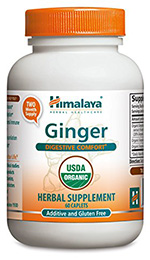 Himalaya Herbs Organic Ginger Extract
Himalaya Herbs Organic Ginger Extract
Himalaya offers a high potency, ultra-pure organic ginger root extract for maximum digestive health benefit. Free of all chemicals, binders and additives, this potent herbal digestive aid is inexpensive and highly effective for a range of digestive issues.
4. Slippery Elm Bark (Ulmus fulva)
Gut Soother & Digestive Tract Healer
Native Americans used the powdered inner bark of the elm tree to make poultices to soothe damaged skin and to draw out poisons from boils and abscesses. European settlers used it, among other herbs for digestion, to calm the terrible digestive problems of typhoid sufferers. Today this digestive herb is a popular remedy for digestive discomfort, such as acid dyspepsia, irritable bowel syndrome, or for the type of problems associated with eating a food that disagrees with you.
Soothing, nutritive, and demulcent in action, slippery elm bark has calming properties. Its moisturizing action eases an upset digestion, protects the stomach and eases diarrhea and intestinal cramps. It neutralizes acidity, coating the mucous membrane lining of the gastrointestinal tract. A gentle form of non-digestible carbohydrate, this herb for digestion makes its way through the gut, flushing out toxic wastes as it transits through the digestive system.
Slippery elm also works as an expectorant by increasing bronchial secretions, loosening up thick and stubborn throat mucus, decreasing the stickiness of troublesome phlegm, and helping the body to remove it.Slippery elm bark comes in powder form and it can be used to make a soothing tea for irritation of the digestive tract. The powder from this digestive herb can be sprinkled on muesli or oatmeal, helpful in healing the lining of the gut in leaky gut syndrome, which makes this one of the very best herbs for digestion.
Where to Get It:
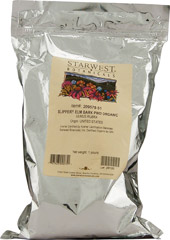 Starwest Organic Slippery Elm Bark Powder
Starwest Organic Slippery Elm Bark Powder
Starwest Botanicals offers a tasty, organic slippery elm bark powder for easy use and maximum potency. Using a powder is ideal for healing the gut and enhancing digestion due to the large surface area covered by the bark in this form. Mixes easily with water or food.
5. Milk Thistle (Silybum marianum)
Liver Reviver & Digestive Bitter Herb
Another one of the herbs for digestion, milk thistle, is a flowering plant of the daisy family, and it has been used for hundreds of years as a digestive herb and a liver strengthener and to treat various liver disorders due to its significant liver-protective actions.
Strange powers were attributed to the milk thistle in medieval times, possibly because it was found growing in graveyards and cloister gardens.
The liver has to work hard to detoxify the body, and this digestive herb’s active property, a flavonoid known as silymarin, has been shown to maintain the health of liver cells and to neutralize the effect of toxins. It has a digestive “bitter tonic” action, helping promote the flow of bile in liver disorders. A popular herbal remedy today, this herb for digestion is used to help maintain a healthy liver and for the relief of an upset stomach or indigestion.
Where to Get It:
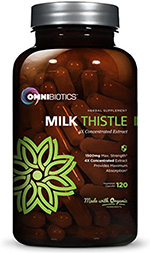 Omnibiotics Organic Milk Thistle Extract
Omnibiotics Organic Milk Thistle Extract
Omnibiotics offers a high potency, concentrated 4:1 milk thistle extract in a vegetarian capsule, free of synthetic ingredients and low quality binders. High in glutathione stimulating silymarin for maximum liver cleansing and hepatoprotective properties, milk thistle is a powerful digestive bitter.
6. Peppermint (Mentha piperita)
Digestive Tonic
The Greek doctor, Dioscorides, is reputed to have regularly worn a sprig of peppermint to lift his spirits. Its antispasmodic actions were recognized by physicians of the ancient world, and peppermint was popular with our more modern ancestors who saw it as a healing herb for digestion and the relief of digestive colic, sluggish digestion, flatulence, and bloating. Used for centuries as a gastrointestinal aid, peppermint is a digestive herb that helps relax the muscles of the digestive tract and stimulates bile flow.
Today this herb for digestion is sold to relieve indigestion, soothe stomach-ache, and relieve colicky diarrhea. Studied extensively, peppermint oil has been accepted as a treatment for irritable bowel syndrome, as the volatile oils help to ease bloating, cramps, and spasms.
Peppermint can be taken in hot infusions (dried herb in boiling water) or used to make a peppermint tea (using commercially made tea bags). It is usually available as enteric coated capsules for the relief of IBS, available in health stores.
Where to Get It:
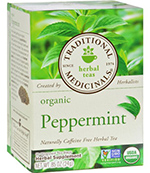 Traditional Medicinals Organic Peppermint Tea
Traditional Medicinals Organic Peppermint Tea
A refreshing, delicious blend of organic peppermint leaves in chemical-free tea bags perfect for enhancing digestion herbally before or after meals.
This article on herbs for digestion is excerpted from Herbs, Plain & Simple: The Only Book You’ll Ever Need by Marlene Houghton, Ph.D. Adapted, and reprinted with permission from Hampton Roads Publishing an imprint of Red Wheel/Weiser. Available wherever books and ebooks are sold or directly from the publisher at redwheelweiser.com or 800-423-7087.
About The Author
Marlene Houghton, Ph.D, is a nutritional counselor, educator, author, and lecturer on natural therapies and the historical use of herbs who teaches people how to stay well. She lives in London.







